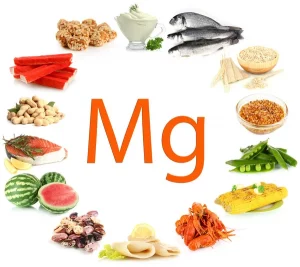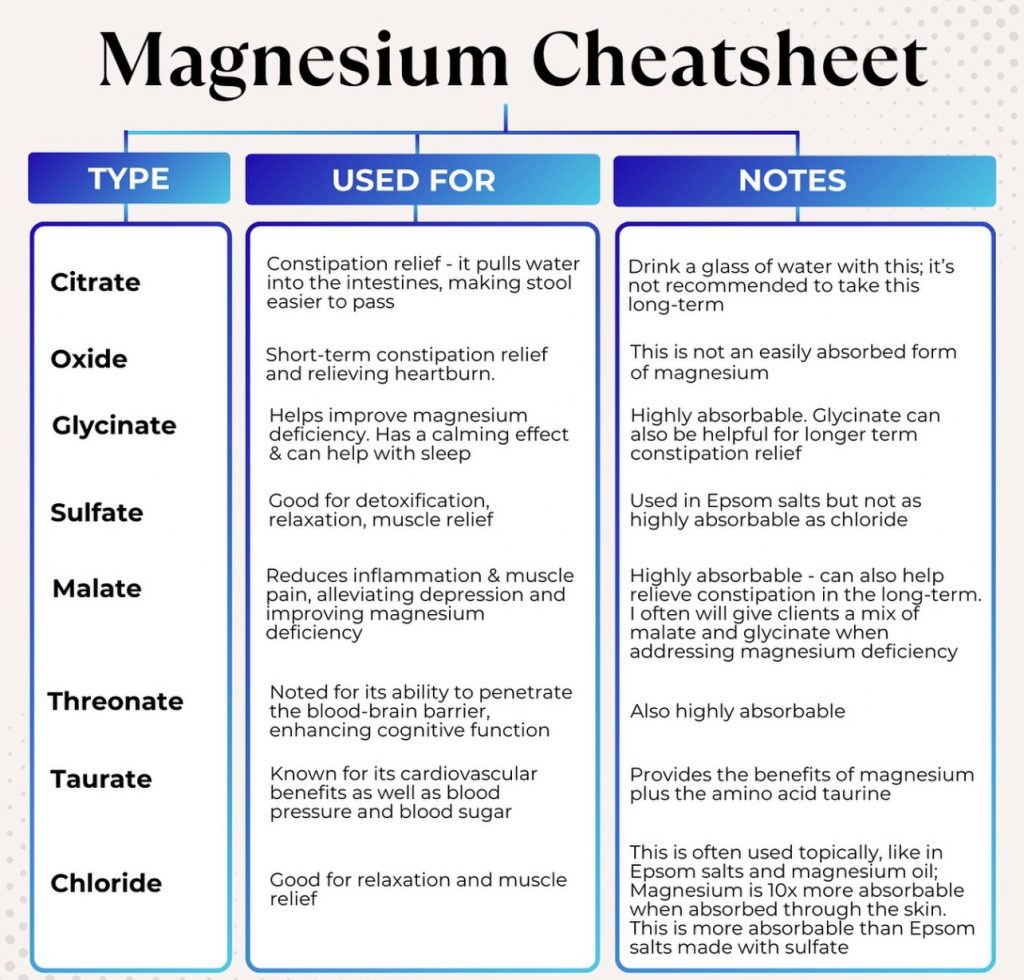The Key Mineral In Our Body

Magnesium is an important mineral that plays a vital role in many bodily functions, including regulating nerve and muscle function, supporting bone health, and helping with sleep. Let’s dive deeper and understand the importance of magnesium and why it is an essential mineral and why low levels can have a significant negative impact on the body and our overall health.
Magnesium is both a mineral and an electrolyte. It is the 4th most abundant mineral in the body, and it is the most deficient in the American population. Magnesium is necessary for electrical activity in the heart and the brain and is also a co-factor in more than 300 reactions within the body. Magnesium is a mineral found naturally in the body and has been well-researched as an important supplement for women as they move through perimenopause and menopause. Magnesium is naturally in our bodies and is found in our bones and soft tissue.
Why We Are Magnesium-Deficient
Here Are Some Reasons Why:
Modern farming methods have shown a depletion of magnesium in the soil.
Reflux disease has become hugely prevalent because of the bad food that we are consuming. A large number of people are now on chronic proton pump inhibitors to reduce acid production. Unfortunately, acid is necessary for absorption of magnesium and it is well recognized that chronic proton pump inhibitor use is associated with an increased risk of magnesium deficiency.
Carbonated beverages also reduce the absorption of magnesium and can compound the problem.
Stress, which is prevalent these days, results in increased magnesium depletion. Lack of sleep also results in increased magnesium usage. Consumption of highly processed foods and foods with high sugar content in our food these days and understanding magnesium is required to break sugar down and this again causes depletion of magnesium.
How We Lose This Essential Mineral
Drinking coffee, tea, and some pharmacological diuretics all cause us to excrete more magnesium in our urine. In particular, diuretics will stop the kidneys from re-absorbing magnesium. Therefore, you can see why we have become so deficient in this vital mineral/electrolyte.
The Effects of Magnesium Deficiency
The signs and symptoms are usually subtle and often, we put them down to the rigors of modern-day living:
Tiredness
Anxiety
Sleep disturbance (insomnia)
Depression
Restless legs
Leg Cramps
Heart palpitations
Twitching eye
Research has linked magnesium deficiency to cardiovascular disease and thrombotic risks through many different mechanisms. Magnesium deficiency leads to hypertension through an increase in catecholamine release, sodium retention, and cholesterol. Atrial fibrillation and atherosclerosis are also associated with deficient magnesium, which is caused by an increase in NF-Capa B signaling. This signaling causes inflammatory cytokines to enter the body, leading to low-grade inflammation.
Ways To Increase Your Magnesium Level
Improve intake by avoiding processed foods and eating organically grown magnesium-rich foods from local growers. We love it when you can get your magnesium from FOODS FIRST. Foods rich in magnesium are also high in fiber, protein and other anti-inflammatory properties. According to the National Institutes of Health the top five foods to add to your diet include:
· Pumpkin Seeds: 1oz = 156mg of Mg
· Chia Seeds: 1oz = 111mg of Mg
· Almonds: 1oz = 80mg of Mg
· Spinach: 1/2cup boiled = 78mg of Mg
· Cashews: 1oz = 74mg of Mg

Health Benefits of Magnesium
· Magnesium has anti-inflammatory benefits
It may help prevent migraine headaches
It may improve PMS symptoms
Perimenopause & Menopause and the Importance of Magnesium
As women move through perimenopause and menopause phases and beyond, low levels of magnesium have been shown to put us at greater risk:
Sleep issues (insomnia)
Heart disease
Osteoporosis
Depression
Anxiety
Research indicates that women need magnesium for hormonal health. It is recommended that women receive at least 320 mg of elemental magnesium per day. Researchers state that magnesium influences different ion levels of estrogen and progesterone in the body, and this may be why it helps with PMS symptoms such as bloating and sleep. More stabilized hormones means increased serotonin, and a better overall mood. A significant reduction of anxiety-related premenstrual symptoms (nervous tension, mood swings, irritability, and anxiety) has been noted with magnesium supplementation.
Types Of Magnesium Supplements:

Oral magnesium supplements can greatly boost magnesium levels and reduce symptoms of magnesium deficiency. Magnesium can also be absorbed through the skin and magnesium lotions and oils which are available in many health shops can help when applied topically to help with restless leg symptoms and leg cramps.
There are so many different types of magnesium supplements. It is beyond the scope of this review to go through each and every one of them and dosage that is best for you. Please consult with a healthcare professional to assess which magnesium supplement is best for you.
Radiant Integrative Health & Wellness hopes you found this post educational and informative.
Get Expert Help At Radiant Integrative Health & Wellness
At Radiant Integrative Health & Wellness we specialize in personalized care including a review of your medical history, symptoms and labs to help you regain control of your health. Our experienced team will work closely with you to evaluate your symptoms, check your labs, and design a treatment plan that meets your unique needs.
Schedule your consultation today and learn how we can help you feel your best and maintain a healthy, active lifestyle as you age.
If you are interested in learning more information about magnesium and it’s importance, please get in touch with Radiant Integrative Health at 702-333-8458

Reach out to Radiant Integrative Health for More Information at
Office Phone: 702-333-8458




